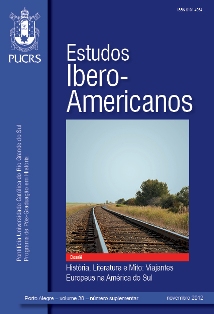The travel of Ercole Luigi Morselli (1904) to Latin America. From the myth of Ulysses to a new version of the myth: Orion (1910) and Glauco (1919)
DOI:
https://doi.org/10.15448/1980-864X.2012.s.12453Keywords:
Ercole Luigi Morselli, Theater and literature of the 19th century, Myth, TravelAbstract
The young Ercole Luigi Morselli (1882-1921), a promising author and playwright to-be, goes on a one-year trip between the Summer of 1903 and the Autumn of 1904. The trip is motivated by a series of needs, including an outward intolerance of traditional rules and teachings by a free and rebellious spirit, animated by great artistic pretension. The desire for "another place" arises from the need to distance himself provisionally from "Madre", a term that should be understood in two ways: as the homeland - the land of letters and culture in which he dreams to assert himself in the future as a writer - and as the progenitor, that is, his mother, Anna Celli, to finally emancipate himself and "grow" as a man and as an artist, while maintaining, through letter, a strong connection to both. Morselli is one of the very few artists of his generation who traveled like this. This fundamental experience makes it possible to trace a kind of artistic and personal itinerary through the correspondence sent to his mother, in which the first clear signs of his ambition as an artist start to appear.Downloads
Downloads
Published
How to Cite
Issue
Section
License
Copyright
The submission of originals to Estudos Ibero-Americanos implies the transfer by the authors of the right for publication. Authors retain copyright and grant the journal right of first publication. If the authors wish to include the same data into another publication, they must cite Estudos Ibero-Americanos as the site of original publication.
Creative Commons License
Except where otherwise specified, material published in this journal is licensed under a Creative Commons Attribution 4.0 International license, which allows unrestricted use, distribution and reproduction in any medium, provided the original publication is correctly cited.






